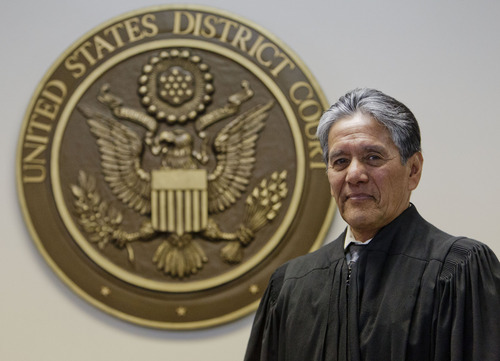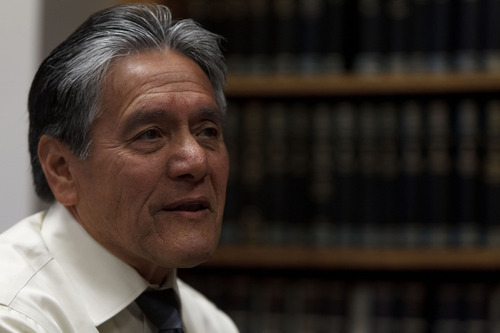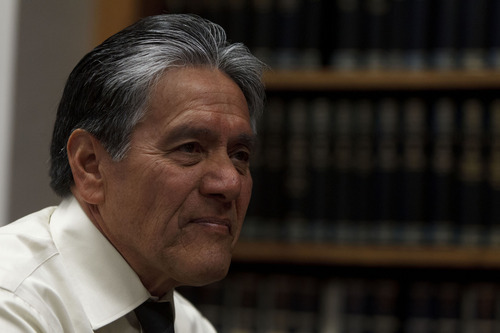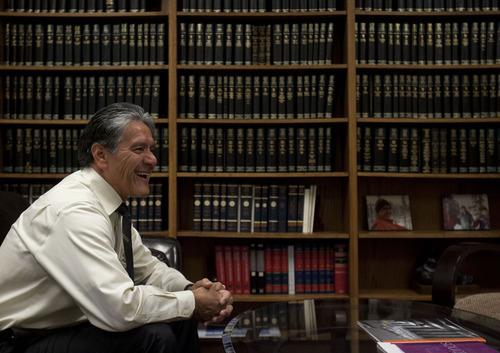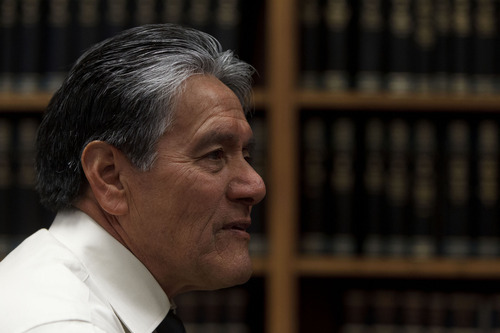This is an archived article that was published on sltrib.com in 2012, and information in the article may be outdated. It is provided only for personal research purposes and may not be reprinted.
During two decades as a federal magistrate judge, Samuel Alba had a hand in some of Utah's most highly publicized legal cases — from the Olympic bribery scandal to the kidnapping of Elizabeth Smart, theft of ancient artifacts from public land and deaths of two little girls exposed to a toxic pesticide.
He pleaded for better security for federal judges before the Senate Judiciary Committee, helped plan the modern new federal courthouse rising south of the existing Frank E. Moss building, and witnessed an evolution in the magistrate judge's role in dispatching cases and court governance. And with that, Alba, who turned 65 in January, decided to call his career as a jurist good and step aside at the end of June.
"I'm not just going out to pasture," he said. "I'm going to continue working."
In July, Alba will join the law firm of Snow, Christensen & Martineau, where he will focus on civil litigation and white-collar criminal defense cases — the sort of cases he handled before becoming a magistrate judge in 1992.
Alba's story is a classic American dream tale. His parents — his mother was a teacher, his father a businessman — migrated from Mexico to the U.S., and moved around the country as farm workers. When Alba was about 14, an uncle suggested they join him in Franklin, Idaho, where there was plenty of work on a local chicken farm. Alba and his father traveled by bus from Eagle Pass, Texas, to the small town at the Utah state line on Christmas Day.
"I went there with the idea I was just going to work," he said. "I had been in school but the problem with migrant work is we would leave school the first week of April but we wouldn't come back until the third week of October, so you missed a number of weeks at the end of the school year and a number of weeks at the beginning of the next year. That's why so many migrant workers, the kids just quit school because they get behind."
It turned out to be a fortuitous move for Alba. The two brothers who owned the farm insisted that Alba attend school during the day, letting him work only before, after and on weekends. Marjorie Keller, his homeroom teacher, also took a special interest in Alba, pushing him to replace his "Spanglish" with real English and to set his sights on college.
"She's the one who pushed me along so I could go on to college, and I'm glad she did because it afforded me a chance to go to college and it set the tone for the rest of my siblings to go on and get a higher education," Alba said.
Among his nine living siblings there are engineers, insurance brokers, business school graduates, a principal and an interpreter for the Church of Jesus Christ of Latter-day Saints.
"Everybody had some sort of degree," he said. "My parents are really, really proud of that, the fact that we've all had the opportunity to get an education in this country."
Alba graduated from Utah State University in Logan and then received a law degree from Arizona State University; while in law school, he became a naturalized U.S. citizen. His first job was with the Federal Public Defender's Office in Phoenix, followed by a stint in private practice in that state. In 1980, Alba joined the U.S. Attorney's Office in Utah, first as an assistant and then chief of the criminal section. In 1987, he became a shareholder at Prince, Yeates & Geldzahler, where he handed commercial litigation and white-collar criminal defense cases.
In 1992, he was appointed as a magistrate — the first Latino federal judge in Utah — and served as chief magistrate between 2003-2008. Alba spent some time traveling to Mexico and Colombia to train prosecutors and judges in hopes of helping them create a more transparent, fair legal system.
"Latin America is absolutely fascinating because countries have realized that there are some basic human rights that are denied individuals in the criminal system ... that they have in those countries," he said. "They are saying we need something closer to an oral presentation where there will be an opportunity to confront the witnesses, there will be an opportunity to really see what the evidence is. ... It's closer to what we do in this country — not quite to that level, but it's a huge step in the right direction."
And a transparent, fair system may offer a "way out" of some of the corruption and violence that has besets some Latin American countries, he added.
Meanwhile, Alba also participated in the transformation of another legal system over the past 20 years as Utah's federal court judges, at the direction of former Chief Judge Dee Benson, leaned more heavily on magistrate judges.
"With every passing year, we have been tasked with more responsibility to the point where now magistrate judges are [assigned] civil cases," he said. "If the parties consent, and the case is assigned to us, we can do civil trials just like the district judges can."
Magistrate judges also now help govern Utah's federal court, are included in management meetings and participate in different committees. Alba, for instance, joined senior Judge Tena Campbell on the building committee that worked with architects to design the new courthouse. He said the new structure pays homage both to its predecessor and, with its glass fronts and open courts, to the transparency that is the goal of the system.
"It's open proceedings, the public welcome to come in and see what goes on, and I think that is part of the expression of the building," he said.
The new building also will vastly improve security for the public, court staff, judges and prisoners alike.
"We've had instances in this building where someone gets sentenced and the prisoner elevator is the judge's elevator, and you see the guy who just got sentenced and one of the judges involved in the case in the same elevator," Alba said. "Well, that doesn't work."
Over the years, the kinds of cases he's been handed have ebbed and flowed, depending on the focus of the U.S. District Attorney in office at the time and what's in vogue — drug cases, gun cases, immigration and, the one surfacing routinely now, civil fraud cases.
Alba lists a handful of wide-ranging cases when asked the highlights of his years on the bench: preliminary hearings for defendants in the Olympic bribery scandal and for murderer Ronnie Lee Gardner and, in 2010, Phillips Electrical v. BC Technical, a case involving copyright, trademark and trade secret infringements. Alba stirred legal observers across the country with his 117-page report and recommendation in the technology case, which was subsequently adopted in whole by Judge Clark Waddoups.
As part of discovery in the case, Alba had ordered the defendants to turn over 10 lap top computers so they could be examined for evidence of pilfering. As it turned out, five lap tops had been wiped.
"And they thought they did it really well without leaving any trace to it," Alba said. "Not so."
Experts found "hash marks" that included titles of deleted files that proved the plaintiffs' claims, which led Alba to find the evidence had intentionally been destroyed and to strike the defendants' response filings. Alba also ordered severe sanctions, including large monetary damages.
"When you don't have an answer in place, the only issue that is left is damages," he said. "That is why there were quite [a few] in the legal community going, 'You better watch out,' because it impacts everyone, it really does. As attorneys you have certain obligations, you make sure that your clients comply with the court orders."
Francis Wikstrom, who first met Alba more than 30 years ago when both worked at the U.S. Attorney's Office, said as a judge his former colleague "had a way of getting to the heart of the issues before him."
"He took those issues very seriously, but has never taken himself seriously. He doesn't let you take yourself seriously, either," said Wikstrom,who described Alba's sense of humor "mischievous."
"He'll come out of left field with a zinger," he said, which lightened many otherwise very serious proceedings.
Alba honed his ability to stand firm long before becoming a judge, though. Utah Supreme Court Justice Ronald E. Nehring, who worked with Alba at Prince, Yeates, said the two were working late one Friday afternoon when someone from the U.S. Attorney's Office delivered a subpoena seeking files of a client represented by another law partner. When they declined to hand over the files, the representative threatened to call law enforcement.
"Sam said, 'Fine, I'm calling the Salt Lake City Police Department to say you're trying to rob us," Nehring recalled. "If it had played out, it would have been an amusing showdown."
In the end, the stand off was resolved with the help of an out-of-state attorney Alba knew.
Because of his background as both a prosecutor and a criminal defense attorney, Alba "was able to see both sides of the picture, and that allowed him to reach fair and sound decisions that protected interests of the parties that appeared before him," Wikstrom said. "On criminal cases, that gave him a real sense of where justice would like in any particular case."
And because he'd handled complex civil cases as an attorney, he "understands that, too."
Alba said there are no "do over" cases he wishes he could revisit.
"I've been reversed a couple of times, but that happens with being a judge," he said. "I still disagree with what they did with it, but I had a different view of it. ... Overall, this has been a great experience for me. I made a decision a long time ago that I wanted to give back to the community, and this has given me an opportunity to do that."
But he does leave with a concern about the growing number of judges, himself included, who are leaving their lifetime appointment to the bench to go back into private practice.
"The reason for that is that Congress has not kept up with giving us even cost-of-living increases when we have merited them," he said. "There is a huge funding crush that is going on and, unfortunately, it impacts the court and it's impacted it in that manner. We are losing great judges who can't afford to continue serving."
A memorable moment
During a 2004 trial involving 12 members of the Soldiers of Aryan Culture, a white supremacist gang, U.S. Magistrate Judge Samuel Alba learned threats were being made against an African American female prosecutor — and himself. He had the defendants brought from the prison to court and imposed strict confinement conditions aimed at quashing their ability to orchestrate such threats.
As Alba announced the conditions, a melee broke out in the courtroom that was quickly quelled by U.S. Marshals and prison guards. When Alba later requested a home security system, he was told there were no funds available. He testified six months later to the Senate Judiciary Committee about security concerns and inequitable response to such situations across the federal court system, comments that helped improve security considerations for judges.


